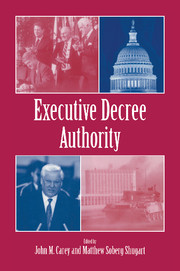Book contents
- Frontmatter
- Contents
- List of Contributors
- Preface
- 1 Calling Out the Tanks or Filling Out the Forms?
- Part I From Delegated to Constitutional Decree Authority
- 2 When the President Governs Alone: The Decretazo in Argentina, 1989–93
- 3 Presidential Decree Authority in Russia, 1991–95
- 4 Presidential Usurpation or Congressional Preference? The Evolution of Executive Decree Authority in Peru
- 5 Presidential Decree Authority in Venezuela
- Part II Constitutional Decree Authority and Conflict Between the Branches
- Part III Absence of Conflict Over Decree
- Appendix of Constitutional Provisions Regarding Decree
- References
- Index
4 - Presidential Usurpation or Congressional Preference? The Evolution of Executive Decree Authority in Peru
Published online by Cambridge University Press: 18 December 2009
- Frontmatter
- Contents
- List of Contributors
- Preface
- 1 Calling Out the Tanks or Filling Out the Forms?
- Part I From Delegated to Constitutional Decree Authority
- 2 When the President Governs Alone: The Decretazo in Argentina, 1989–93
- 3 Presidential Decree Authority in Russia, 1991–95
- 4 Presidential Usurpation or Congressional Preference? The Evolution of Executive Decree Authority in Peru
- 5 Presidential Decree Authority in Venezuela
- Part II Constitutional Decree Authority and Conflict Between the Branches
- Part III Absence of Conflict Over Decree
- Appendix of Constitutional Provisions Regarding Decree
- References
- Index
Summary
The only element of democracy in Peru today is the electoral process, which gives Peruvians the privilege of choosing a dictator every five years. Rule making is subsequently carried out in a vacuum, with the executive branch enacting new rules and regulations at a clip of 134,000 every five years (an average of 106 each working day) without any feedback from the population.
HERNANDO DE SOTO, THE INTERNATIONALLY RENOWNED ADVOCATE FOR PERU'S VAST INFORMAL SECTOR, AND DEBORAH ORSINI (DE SOTO AND ORSINI 1991:106)Peru appears to be very inhospitable terrain for exploring the ideas ventured in the introductory chapter of this volume. Guillermo O'Donnell categorizes the country as one of the purest cases of “delegative democracy,” in which elected presidents govern with few, if any, institutional constraints (1994). Lending credence to such a characterization is a variety of recent works by prominent experts on Peru. During the 1980s the administrations of Fernando Belaunde and Alan García faced few obstacles in using various kinds of decree to routinely promulgate major policies and supersede legislation passed by Congress. In the 1990s Peru's current president, Alberto Fujimori, has epitomized the sort of messianic, anti-institutional leader typically found in O'Donnell's delegative democracy. If periodic elections to choose a “dictator” for the next presidential term are indeed the only important characteristic of Peruvian democracy, then it makes little sense to distinguish among different types of decree authority, to analyze legislative or other institutional checks on decree, or to consider congressional preferences.
- Type
- Chapter
- Information
- Executive Decree Authority , pp. 104 - 141Publisher: Cambridge University PressPrint publication year: 1998
- 6
- Cited by



